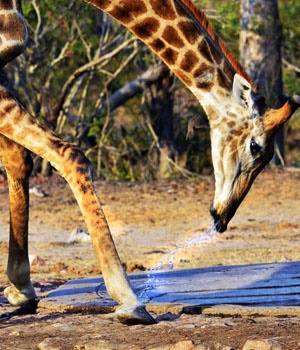
As drought wreaks havoc in inland provinces and parts of KwaZulu-Natal, it’s a game of survival of the fittest in the Kruger National Park.
Dry patches of vegetation can be seen as one enters the popular park. It is summer, but the grass is brown and the bush is not as thick as it should be.
The current drought has drastically lowered the water levels of five perennial rivers – Sabie, Crocodile, Olifants, Letaba and Luvuvhu – and the water levels are very low for this time of year. Deep pools have formed in sections of the Sabie River, where hippos – which need a lot of water to survive – huddle together as the water levels recede. All seasonal rivers are dry, and so are the dams.
If it does not rain soon, most herbivorous animals will starve to death because of a lack of food, or they will get weak and become easy prey for predators.
Mass wildlife deaths have not yet happened in the park, but the heat wave brought on by El Niño will be felt throughout the 2015/16 season, and it is already affecting water supply for households and farmers in KwaZulu-Natal, North West, Eastern Cape, Limpopo and Northern Cape.
The park’s science manager, Izak Smit, said they were not too concerned about the drought’s effects on the Big Five attractions, which bring 1.1 million local and foreign tourists to the Kruger annually.
Tourists would not run out of water, he said, because the park had contingency plans in place such as boreholes, and it permanently enforced water restrictions.
Smit argues that the drought plays an important role in nature and in the ecosystem, which is opposite to the crippling effect it has on farming. The drought will eliminate diseased and old animals, and leave the strong ones behind, which will then be able to survive many other setbacks.
“The drought is not necessarily a bad thing,” he said. “The diseased and the old animals will die, but the cream of the crop will be able to move to an area where there will be water and survive. To us, this is just a natural regulatory process,” Smit said.
“The park has water holes that are filled by boreholes in the naturally wet areas. These are the areas where the stronger animals will migrate to in search of water,” he said.
Smit said predators like lions and scavengers like vultures would have more food and breed more. The dry period, he said, was also good for short-grass grazers like the blue wildebeest, which will survive. But it is bad for browsers like kudu, which eat leaves, because they are the first to dry out. Elephants and zebras are naturally drought-resistant and do not suffer much.
He said that there had regularly been intermittent below-average rainfall in the park, but that only reduced animal populations – it never wiped them out.
During the 1991/92 drought, when the park received 44% of its usual rainfall, for example, only 14 000 buffaloes were left in the park after many died due to a lack of food, but the number has since picked up to 40 000 in this season.
The same process might recur this time around, should the heat wave linger, Smit said, but the park had so far received 70% of the usual rainfall, which is not too bad.
There have been mild droughts over the past 24 years, which did not have a negative effect on the park.
Smit warned, however, that the heat wave increased the likelihood of fires, but – with less rainful and reduced grass levels thanks to herbivore feeding – there was no fuel load to cause devastating veld fires.




 Publications
Publications
 Partners
Partners








